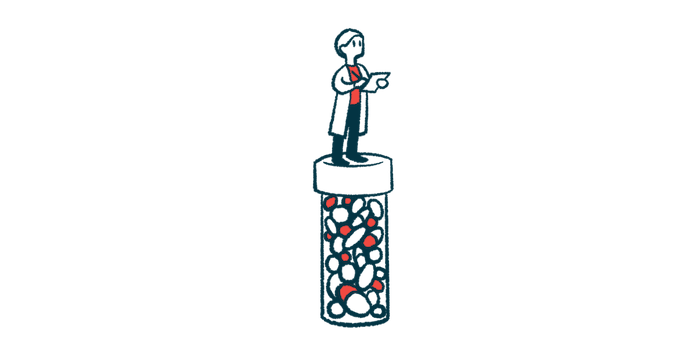Lung inflammation in COPD is reduced with a form of vitamin B3
Inflammation can result in reduced lung function, making finding significant
Written by |

Oral supplementation with nicotinamide riboside, a form of vitamin B3, helped reduce markers of lung inflammation in older adults with chronic obstructive pulmonary disease (COPD), data from a placebo-controlled study shows.
The benefits were sustained for at least three months after supplementation ended.
These findings are “significant, because inflammation can lead to reduced lung function in these patients,” Morten Scheibye-Knudsen, MD, PhD, the study’s co-senior author and associate professor at the University of Copenhagen’s Center for Healthy Aging, in Denmark, said in a university press release. “We hope this research will pave the way for new treatment options for COPD patients, but first we need to continue to analyze and validate the results in larger and more comprehensive studies.”
The study, “Effect of nicotinamide riboside on airway inflammation in COPD: a randomized, placebo-controlled trial,” was published as a letter in Nature Aging. Two of its authors work for Elysium Health, which sells dietary supplements and supplied the nicotinamide riboside for the study.
COPD is an inflammatory disease that’s often linked to lifelong cigarette smoking or secondhand smoke exposure. It usually results in symptoms that include shortness of breath, persistent cough, wheezing, and frequent airway infections, making everyday activities difficult.
Nicotinamide riboside helps the body produce energy and repair cells. Often used in dietary supplements, it’s thought to reduce inflammation and support healthy aging by replenishing the levels of the molecule nicotinamide adenine dinucleotide (NAD+), which usually declines with age.
“As we age, we seem to metabolize a molecule known as NAD. The loss of this molecule is also seen after DNA damage, for instance the type of damage associated with smoking,” Scheibye-Knudsen said.
Assessing inflammation with vitamin B supplement
The University of Copenhagen launched a single-center trial (NCT04990869) at the Respiratory Research Unit at Bispebjerg Hospital in Copenhagen to test nicotinamide riboside against a placebo for its potential as a COPD treatment. The study included 40 adults, mean age 71.9, who had COPD, a history of heavy smoking, and low numbers of eosinophils, a type of immune cell that’s usually linked to more severe COPD symptoms. Twenty adults who never smoked, but were similar to the patients in age, sex, and body mass index (BMI), but didn’t have a history of lung disease, served as controls. BMI is a ratio of height and weight.
Both patients and controls were randomly assigned to receive either 2 g of nicotinamide riboside — taken as four capsules of 250 mg in the morning and four in the evening — or a placebo every day for six weeks. They were then followed for 12 more weeks, or about three months.
The main goal was to assess changes in IL-8, a pro-inflammatory molecule implicated in COPD, in sputum, or mucus, coughed up from the lungs. Secondary goals included changes in blood levels of other markers of inflammation, as well as of NAD+.
Nicotinamide riboside supplementation was safe and well tolerated in both patients and healthy controls, the results showed.
After six weeks, sputum IL-8 levels from patients on nicotinamide riboside were 52.6% lower than from those given a placebo. While the measurements varied widely, this reduction persisted until at least 12 weeks after the treatment ended.
Also, higher IL-8 levels before treatment were significantly linked to a greater post-treatment drop with nicotinamide riboside supplementation, “which may suggest that [nicotinamide riboside] has a stronger effect in individuals with higher [study start] inflammation,” the researchers wrote.
At the study’s start, COPD patients had lower NAD+ levels than healthy controls, higher levels being significantly associated with better lung function. Six weeks of supplementation more than doubled NAD+ in the blood of both patients and healthy controls.
Supplementation also increased the activity of genes linked to DNA repair and slowed aging in airway cells that had been collected by gently scrapping the inside of the nose with a small brush.
“Although the size of this mechanistic study precluded assessment of the effect on clinical outcomes, our findings suggest that [nicotinamide riboside] may be able to reduce lung inflammation and, thereby, reduce the risk of exacerbations and improve clinical outcomes,” thereby potentially representing “a viable treatment option for patients with COPD,” wrote the researchers, who noted their analyses must be confirmed, owing to an small number of patients studied.
“Even though the results are promising, we need to carry out more studies on larger populations to confirm our findings and to determine the long-term effects of nicotinamide riboside in treatment for COPD,” Scheibye-Knudsen said. “Only through thorough research will we be able to offer the best and most effective treatment to people suffering from this difficult disease.”




